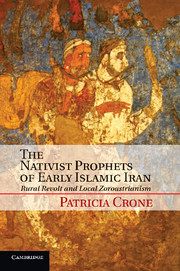Crossref Citations
This Book has been
cited by the following publications. This list is generated based on data provided by Crossref.
Crone, Patricia
2012.
The QuranicMushrikūnand the resurrection (Part I).
Bulletin of the School of Oriental and African Studies,
Vol. 75,
Issue. 3,
p.
445.
2013.
BOOKS RECEIVED FOR REVIEW.
Bulletin of the School of Oriental and African Studies,
Vol. 76,
Issue. 1,
p.
201.
Crone, Patricia
2013.
The QuranicMushrikūnand the resurrection (Part II).
Bulletin of the School of Oriental and African Studies,
Vol. 76,
Issue. 1,
p.
1.
Shaked, Shaul
2013.
Early Persian Documents from Khorasan.
Journal of Persianate Studies,
Vol. 6,
Issue. 1-2,
p.
153.
Kumar, Krishan
2014.
The Return of Civilization—and of Arnold Toynbee?.
Comparative Studies in Society and History,
Vol. 56,
Issue. 4,
p.
815.
Hayes, Edmund
2015.
The Death of Kings: Group Identity and the Tragedy of Nezhād in Ferdowsi's Shahnameh.
Iranian Studies,
Vol. 48,
Issue. 3,
p.
369.
Rezakhani, Khodadad
2015.
Mazdakism, Manichaeism and Zoroastrianism: In Search of Orthodoxy and Heterodoxy in Late Antique Iran.
Iranian Studies,
Vol. 48,
Issue. 1,
p.
55.
2015.
The Wiley Blackwell Companion to Zoroastrianism.
p.
555.
Payne, Richard E.
2016.
Sex, Death, and Aristocratic Empire: Iranian Jurisprudence in Late Antiquity.
Comparative Studies in Society and History,
Vol. 58,
Issue. 2,
p.
519.
Azad, Arezou
2016.
Living happily ever after: fraternal polyandry, taxes and “the house” in early Islamic Bactria.
Bulletin of the School of Oriental and African Studies,
Vol. 79,
Issue. 1,
p.
33.
Mirzaakhmedov, Sirodzh D.
2016.
The Ribāṭ-Caravanserais from the Eastern Suburbs of Paykand. Archaeological and Historical Aspects.
Journal of Inner Asian Art and Archaeology,
Vol. 7,
Issue. ,
p.
109.
Zia-Ebrahimi, Reza
2016.
Better a Warm Hug than a Cold Bath: Nationalist Memory and the Failures of Iranian Historiography.
Iranian Studies,
Vol. 49,
Issue. 5,
p.
837.
Robinson, Chase F.
2017.
Slavery in the Conquest Period.
International Journal of Middle East Studies,
Vol. 49,
Issue. 1,
p.
158.
Reinhart, A. Kevin
2017.
What We Know about Maʿrūf.
Journal of Islamic Ethics,
Vol. 1,
Issue. 1-2,
p.
51.
SHADDEL, MEHDY
2017.
The Sufyānī in Early Islamic Kerygma: An Enquiry into His Origins and Early Development.
Journal of the Royal Asiatic Society,
Vol. 27,
Issue. 3,
p.
403.
Betjemann, Peter
2017.
The Ends of Time: Abolition, Apocalypse, and Narrativity in Robert S. Duncanson’s Literary Paintings.
American Art,
Vol. 31,
Issue. 3,
p.
80.
Peacock, A. C. S.
2018.
Firdawsi’sShahnamain its Ghaznavid Context.
Iran,
Vol. 56,
Issue. 1,
p.
2.
Di Cosmo, Nicola
and
Maas, Michael
2018.
Empires and Exchanges in Eurasian Late Antiquity.
Daryaee, Touraj
2018.
A Companion to Late Antique Literature.
p.
103.
Deeg, Max
2018.
A Companion to Religion in Late Antiquity.
p.
233.



